Lucy Grealy’s Autobiography of a Face deals with the life of Lucy Grealy, who faced
the negative consequences of terminal cancer after the partial removal of her jaw. Like Lucy
Grealy, A.M. Homes also faced the negative consequences as she was found by her
biological mother, who put her up for adoption after her birth. Both memoirs have similar
narrative structures and a lot in common in terms of content; however, they have significant
differences as well.
[...]
Table of Contents
- Two Powerful Women on Their Journey through Life
- Overcoming the Monster
- Hospital
- Home
- School
- The Tragic Flaw Plot
- The Heroic Quest Plot
- Meeting the biological family
- Searching for identity
- Writing Style and Choice of Words
Objectives and Key Themes
This research paper compares and contrasts the autobiographies of Lucy Grealy, Autobiography of a Face, and A.M. Homes, The Mistress's Daughter. It examines how both women navigated the challenges of their unique experiences, emphasizing their shared struggles with identity and belonging.
- Overcoming Trauma and Disfigurement
- The Impact of Family Relationships
- Navigating Identity and Belonging
- The Role of Society's Beauty Standards
- Finding Acceptance and Healing
Chapter Summaries
Autobiography of a Face explores Lucy Grealy's journey through the physical and emotional challenges of living with a disfigured face. The narrative focuses on her struggles with her illness, her family's reactions, and the societal pressures she faced. Grealy's writing reveals her deep loneliness and her struggle to find acceptance, particularly highlighting her parents' lack of support and the hurtful comments she received from others. The text reveals the profound impact of her disfigurement on her sense of self and her ability to navigate the world.
The Mistress's Daughter delves into A.M. Homes's quest to understand her identity after discovering her biological mother. Homes's narrative traces her journey through a complex web of emotions as she grapples with her adoption, her relationships with both her adopted and biological parents, and her sense of belonging. The text emphasizes the challenges of reconciling multiple identities and navigating the complexities of family ties. Homes's story ultimately reveals a path towards acceptance and self-discovery as she learns to embrace her unique past.
Keywords
This research paper explores themes of disfigurement, adoption, family relationships, identity, belonging, societal beauty standards, trauma, acceptance, and healing. It draws from the personal experiences of two powerful women, Lucy Grealy and A.M. Homes, who share their struggles and resilience in their respective autobiographies.
Frequently Asked Questions
What is the main subject of Lucy Grealy’s "Autobiography of a Face"?
The memoir details Lucy Grealy's life after losing part of her jaw to terminal cancer and her subsequent struggle with physical disfigurement and societal beauty standards.
What is A.M. Homes's "The Mistress’s Daughter" about?
It is a memoir about the author's journey to find her biological parents and the emotional complexity of navigating her identity as an adopted child.
What themes do both memoirs share?
Both memoirs explore themes of trauma, family relationships, the search for identity, and the struggle for acceptance and belonging.
How does societal beauty affect Lucy Grealy’s story?
Grealy highlights how society's rigid beauty standards intensified her loneliness and made her feel excluded due to her facial disfigurement.
What is the "Heroic Quest Plot" in Homes's narrative?
It refers to her search for her biological family and the difficult process of reconciling her multiple identities to find self-discovery.
- Citar trabajo
- Annemarie Wendicke (Autor), 2008, Lucy Grealy’s "Autobiography of a Face" and A.M. Homes "The Mistress’s Daughter", Múnich, GRIN Verlag, https://www.grin.com/document/94566



